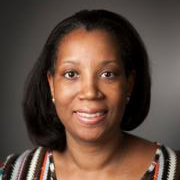
Chekesha M. Watson
Biography
Chekesha Liddell received a Bachelor of Science in Chemistry with Highest Distinction from Spelman College (1999) and a Bachelor of Materials Engineering from Georgia Institute of Technology (1999), [Atlanta University Center, Dual Degree Engineering Program]. She was awarded the NASA Women in Science and Engineering Scholarship to support her undergraduate work including an honors thesis on the Synthesis and Characterization of m-Aminobenzenarsonic acid, an important standard for understanding the metabolysis of arsenic in poultry. Liddell also held three internship appointments at NASA, Kennedy Space Center in the Cryogenics and External Tank Branch and the Microchemical Analysis Laboratories. She joined the Cornell University faculty in November of 2003, after receiving a Ph.D. in Materials Science and Engineering with a minor in Science and Technology Policy from Georgia Tech. Liddell's awards for scholarly achievement include the National Science Foundation (NSF) Career Award [Nonspherical, Active, and "Inverted" Bases for Optimized Photonic Crystal Design] (2006); Facilitating Academic Careers in Engineering and Sciences Career Initiation Grant, (2003); Office of Naval Research Graduate Fellowship (1999-2003); Georgia Tech President's Fellowship, (1999-2003); Facilitating Academic Careers in Engineering and Sciences Fellowship (1999-2003); NSBE, National Society of Black Engineers Fellow, (2000); Hertz Foundation Fellowship Grant, (1999); TMS materials society, J. Keith Brimacombe Presidential Scholarship, (1999); ASM Foundation Scholarship, ASM International materials society, (1998); and the ASTM, American Society for Testing and Materials, Mary R. Norton Memorial Fellowship, (1999). Liddell is a member of Phi Beta Kappa, the American Chemical Society, the Materials Research Society, the Cornell Center for Materials Research (CCMR) and the Cornell Center for Nanoscale Systems (CNS).
Research Interests
The Liddell group research efforts focus on the development of colloid-based materials [using synthetic chemistry, surface modification, self-assembly and field-directed assembly] and on understanding the relationship between their structure and properties to provide engineering solutions for the micron and submicron length scales. We integrate fundamental science in the areas of inorganic and organic chemistry, interface science, materials science (principles for electronic, optical, magnetic, mechanical behavior of materials), condensed matter physics, and thermodynamics to design and fabricate materials for applications requiring low cost manufacture with performance tied to control of micro- and nanostructures. In particular, we address the limitations in achieving optimum photonic crystal materials for photonic technologies such as optical integrated circuits, light sources, photocatalysts, and solar cells. Photonic crystals [PCs, photonic bandgap (PBG) materials, periodic dielectrics] modify the dispersion relations and strongly affect the distribution of electromagnetic modes within dielectric materials, offering unique control of light; for example, enhanced or inhibited spontaneous emission of molecules and "super"-prism beam steering effects, with large angular dispersion (>50º) observed for small wavelength differences (~10nm).
Our work addresses the central challenge in the photonic crystal field, to develop inexpensive fine-scale periodic materials with sizable PBGs or large partial PBGs (stopbands) at visible and near-IR frequencies. Calculations indicate the materials design characteristics favorable for this achievement include a sub-micron lattice constant, a high refractive index contrast (high-n) between periodic regions, low optical absorption, and low filling fraction of high-n material (ordered porous structure). The crystal structure and shape and complexity of the photonic crystal basis also greatly influence the capability of photonic crystals to exhibit PBGs, by removing symmetry induced degeneracy in the photonic bands. For the past 15 years experimental achievements have been mainly limited to simple inverted face-centered cubic (FCC) structures templated from close-packed spheres due to [1] the lack of availability of non-spherical particles with consistent size and shape (CV<5%) in a variety of chemistries and [2] the lack of processes for particle orientation control which would lead to complex topologies and new lattice structures. Because of the spherical symmetry at lattice points, the inverted FCC structure exhibits weak light-matter interactions and fragile bandgaps (5% width as given by gap-midgap ratio) which close with minor structural disorder.
We create complex colloidal crystals from buildings blocks with diverse morphology [i.e., non-spherical, core-shell] and with functionality [i.e., fluorescent, magnetic]. Our experiments investigate the effects of colloid particle chemistry, shape, size, packing, orientation, and refractive index on photonic band structures and the resulting optical properties of photonic crystals with the ultimate goal of developing new functional (beyond passive waveguiding) photonic crystal structures. These studies are complemented by our fundamental interests in understanding colloidal self-assembly and the phase behavior of complex colloid shapes.
Selected Publications
- Gerbode, S. J., D. C. Ong, Chekesha M. Liddell, I. Cohen. 2010. "Dislocations and Vacancies in 2-D Mixed Crystals of Spheres and Dimers." Physical Review E 82 (4): 041404-1 -- 041404-7.
- Hosein, D., S. H. Lee, Chekesha M. Liddell. 2010. "Dimer-Based Three-Dimensional (3D) Photonic Crystals." Advanced Functional Materials 20 (18): 3085-3091.
- Gerbode, S. J., U. Agarwal, D. C. Ong, Chekesha M. Liddell, F. Escobedo, I. Cohen. 2010. "Glassy Dislocation Dynamics in 2D Colloidal Dimer Crystals." Physical review letters 105 (7): 078301-1 - 078301-4.
- Riley, E. K., Chekesha M. Liddell. 2010. "Confinement-controlled self assembly of colloids with simultaneous isotropic and anisotropic cross-section." Langmuir 26 (14): 11648-11656.
- Hosein, I. D., M. Ghebrebrhan, J. D. Joannopoulos, Chekesha M. Liddell. 2010. "Dimer Shape Anisotropy: A Nonspherical Colloidal Approach to Omnidirectional Photonic Band Gaps." Langmuir 26 (3): 2151-2159.
Selected Awards and Honors
- Emerging Scholars Class of 2011 (Diverse Issues in Higher Education magazine) 2011
- Provost's Award for Distinguished Research for 2010 (Office of the Provost, Cornell University) 2010
- Dow Distinguished Lecturer (University of California at Santa Barbara UCSB) 2009
- Certificate of Appreciation for Mentoring (Alfred P. Sloan Foundation) 2007
- Frontiers of Science Symposium Invitee (National Academy of Science (NAS) and Japan Society for the Promotion of Science) 2007
Education
- B. Sc. (Bachelor of Science in Chemistry), Spellman College, 1999
- B. Sc. (Bachelor of Materials Engineering), Georgia Institute of Technology, 1999
- Ph D (Materials Engineering), Georgia Institute of Technology, 2003

